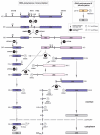Pre-Ribosomal RNA Processing in Human Cells: From Mechanisms to Congenital Diseases
- PMID: 30356013
- PMCID: PMC6315592
- DOI: 10.3390/biom8040123
Pre-Ribosomal RNA Processing in Human Cells: From Mechanisms to Congenital Diseases
Abstract
Ribosomal RNAs, the most abundant cellular RNA species, have evolved as the structural scaffold and the catalytic center of protein synthesis in every living organism. In eukaryotes, they are produced from a long primary transcript through an intricate sequence of processing steps that include RNA cleavage and folding and nucleotide modification. The mechanisms underlying this process in human cells have long been investigated, but technological advances have accelerated their study in the past decade. In addition, the association of congenital diseases to defects in ribosome synthesis has highlighted the central place of ribosomal RNA maturation in cell physiology regulation and broadened the interest in these mechanisms. Here, we give an overview of the current knowledge of pre-ribosomal RNA processing in human cells in light of recent progress and discuss how dysfunction of this pathway may contribute to the physiopathology of congenital diseases.
Keywords: Diamond–Blackfan anemia; RNA processing; endonucleases; exonucleases; ribosomal RNAs (rRNAs); ribosomal stress; ribosomopathies.
Conflict of interest statement
The authors declare no conflicts of interest.
Figures





Similar articles
-
Mutation of ribosomal protein RPS24 in Diamond-Blackfan anemia results in a ribosome biogenesis disorder.Hum Mol Genet. 2008 May 1;17(9):1253-63. doi: 10.1093/hmg/ddn015. Epub 2008 Jan 29. Hum Mol Genet. 2008. PMID: 18230666
-
Domain III of Saccharomyces cerevisiae 25 S ribosomal RNA: its role in binding of ribosomal protein L25 and 60 S subunit formation.J Mol Biol. 2000 Feb 11;296(1):7-17. doi: 10.1006/jmbi.1999.3432. J Mol Biol. 2000. PMID: 10656814
-
[About the ribosomal biogenesis in human].Med Sci (Paris). 2015 Jun-Jul;31(6-7):622-8. doi: 10.1051/medsci/20153106015. Epub 2015 Jul 7. Med Sci (Paris). 2015. PMID: 26152166 Review. French.
-
Probing the mechanisms underlying human diseases in making ribosomes.Biochem Soc Trans. 2016 Aug 15;44(4):1035-44. doi: 10.1042/BST20160064. Biochem Soc Trans. 2016. PMID: 27528749 Free PMC article. Review.
-
[Diamond-Blackfan anemia reveals the dark side of ribosome biogenesis].Med Sci (Paris). 2009 Jan;25(1):69-76. doi: 10.1051/medsci/200925169. Med Sci (Paris). 2009. PMID: 19154697 Review. French.
Cited by
-
The Effect of Interferons on Presentation of Defective Ribosomal Products as HLA Peptides.Mol Cell Proteomics. 2021;20:100105. doi: 10.1016/j.mcpro.2021.100105. Epub 2021 Jun 1. Mol Cell Proteomics. 2021. PMID: 34087483 Free PMC article.
-
U8 variants on the brain: a small nucleolar RNA and human disease.RNA Biol. 2022;19(1):412-418. doi: 10.1080/15476286.2022.2048563. Epub 2021 Dec 31. RNA Biol. 2022. PMID: 35389826 Free PMC article. Review.
-
Labeling of heterochronic ribosomes reveals C1ORF109 and SPATA5 control a late step in human ribosome assembly.Cell Rep. 2022 Mar 29;38(13):110597. doi: 10.1016/j.celrep.2022.110597. Cell Rep. 2022. PMID: 35354024 Free PMC article.
-
Genome-wide RNAi screen identifies novel players in human 60S subunit biogenesis including key enzymes of polyamine metabolism.Nucleic Acids Res. 2022 Mar 21;50(5):2872-2888. doi: 10.1093/nar/gkac072. Nucleic Acids Res. 2022. PMID: 35150276 Free PMC article.
-
The intracellular domain of β-dystroglycan mediates the nucleolar stress response by suppressing UBF transcriptional activity.Cell Death Dis. 2019 Feb 27;10(3):196. doi: 10.1038/s41419-019-1454-z. Cell Death Dis. 2019. PMID: 30814495 Free PMC article.
References
Publication types
MeSH terms
Substances
LinkOut - more resources
Full Text Sources
Other Literature Sources
Miscellaneous

